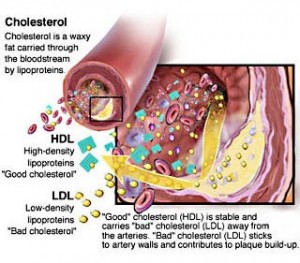(ThyBlackMan.com) Do you know where your cholesterol is? Don’t assume your cholesterol is fine just because the doctor said so several years ago.
If your doctor determines your fasting total cholesterol level exceeds 200 or if your LDL cholesterol level is above 100, you can get it down safely with these simple lifestyle modifications.
1. Set a target.
How low can you go? Well, that depends. If you have a family or personal history of heart disease, high blood pressure, diabetes, smoking, obesity or other high risk factors, your doctor might set a goal of less than 70. A target  of less than 130 is generally okay for people with moderate risk factors. If you have two or more risk factors, it’s important to get treatment early.
of less than 130 is generally okay for people with moderate risk factors. If you have two or more risk factors, it’s important to get treatment early.
2. Get physical.
Regular moderate exercise can lower LDL, bad cholesterol, and raise good cholesterol or HDL by up to 10 percent. Take a brisk walk for 30-45 minutes five days a week. No matter what moderate physical activity you chose it’s important to do it regularly and stay consistent.
3. Steer clear of saturated fat.
Gone are the days when doctors thought the answer was to cut back on egg intake. It is saturated fat that is the main culprit. That means slow down on the butter, shortening, lard, stick margarine, and substitue canola oil or olive oil in place of vegetable oil.
4. Eat more fiber.
Whole grains, fruits and vegetables are good sources of antioxidants and dietary fiber. Soluble fiber especially can help lower cholesterol. It absorbs cholesterol like a sponge, so incorporate more beans, barley and oats into your diet.
5. Go fish.
Fish is full of cholesterol-lowering omega-3 fatty acids. Salmon and canned tuna are great sources of omega-3s. The recommendation is two or three servings a week.
Fish oil supplements can also have a profound effect on cholesterol levels. Plant sources of omega-3s, however, simply do not provide the same type of omega-3s as fish. Fish and fish oil are chockablock with cholesterol-lowering omega-3 fatty acids. The American Heart Association recommends fish as the preferred source of omega-3s but if fish is not an option talk to your doctor about supplements.
6. Drink up.
Moderate alcohol usage can raise good cholesterol levels up to 10 percent. Moderate consumption is up to one drink a day for women and up to two for men. Excessive drinking, however is dangerous and the American Heart Association does not recommend you to increase your drinking or start drinking if you do not already.
7. Drink green.
Green tea is an excellent alternative to sodas and other sugary drinks. Research shows that green tea contains bad cholesterol-lowering compounds. A recent study from Brazil shows green tea extract can reduce LDL cholesterol by about 4.5 percent.
8. Go nuts.
Nuts, especially walnuts and almonds, can bring fairly small reductions in cholesterol. Nuts are high in calories so a handful of nuts a day will suffice.
9. Can’t believe it’s not butter.
Margarine-like spreads have taken over the dairy sections of grocery stores. For a spread with cholesterol lowering benefits look for ones fortified with stanol. Stanols are a plant product that inhibits the body’s absorption of cholesterol.
10. Stay smoke free.
Smoking is bad for your health for many reasons. If you want to keep your cholesterol in check, kick the habit. Smoking lowers good cholesterol levels. This habit is a major risk factor for heart disease.
11. Consider medication.
Lifestyle modifications are essential to your success in lowering cholesterol and keeping it there. Michael Richman, MD, medical director of the Center for Cholesterol Management in Los Angeles, emphasizes medication in addition to lifestyle modification is the only way to quickly lower high cholesterol.
Niacin, fibrates, bile acid resins and statins are some common medicines available to lower cholesterol. Statins in particular are the drug of choice because they can lower cholesterol by 20 to 50 percent. However, it is up to your doctor to determine what medicine and course of action is best for you.
Because levels often increase with age, cardiologists recommend everyone over the age of 20 be screened at least once every five years. Those at high risk for heart disease should be tested even more frequently. Talk to your doctor about your last cholesterol screening to find out if you are due for another one.
Written By Kelly Taylor

















I particularly like your comments about the margarine-like spreads. Some of the artificial “butters” are less healthy than real butter. Checking the label for Stanols is a good tip. Stanols reduce LDL cholesterol.